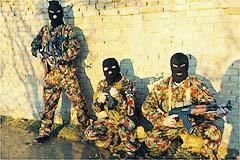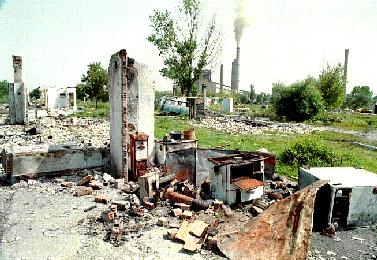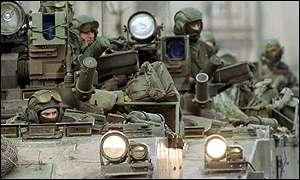On the phone with the office for
foreigners of a central police office in Northern Italy, I try to explain
what is happening to the Roma. A woman answers "I don't know whether you
are aware of the fact that the war is over... nothing has been happening
for a long time in Kosovo". A death without any rubber stamp, without
the right even to be a death.
Fifty or more years ago, they tell me, Miloshevich
conquered Kosovo from the Turks in a great battle, and swore that the land
would always be Serbian; and now Clinton wants to steal it from him.
Fire and uranium poured down for eighty days
and eighty nights, twice Noah's flood... cluster bombs from the sky and
mines underground for children to play with forever and ever. Death from
above, invisible as the plague.
Graçanica hosts a flak battery, with
one Serbian boy to guard it. Suddenly, a pilotless drone appears far away.
The boy calls together his friends, Serbs and Roma, and asks them how many
bottles of beer they will buy him if he knocks the plane down. He collects
the promises, shoots and brings the drone down.
Arkan, the savage spouse of the beautiful
singer Ceca, so loved by the Roma, comes to stay in a hotel in Prishtina,
and sees a Rom girl, a cousin of Lulzim, who works as a chambermaid. He
summons her and asks her whether they treat her like they treat the Serbs;
then he gives her a little box, telling her to open it only when she is
away. The Romni goes to the closet where she keeps her few belongings,
opens the box and finds 1,500 German Marks in it. "Miloshevich has a hundred
times as much money as Arkan, but he has never done anything for anybody,
whereas Arkan has always given to the Roma", they say. However, somebody
answers saying that Arkan gave out of cold calculation, not out of true
compassion. Like Sheshelj, who found more or less useful jobs for
the Roma throughout Yugoslavia, being accused by the Serbs of being too
friendly towards the Gypsies.
During a night of heavy bombing, a column
of fire rises up from Prishtina, just as Altna is giving birth to little
Xhevrija in the town hospital.
Then the storm ceases, for a moment.
 KLA guerrillas
KLA guerrillas
Men from the West come, apparently British.
Together with them, the Albanians of Kosovo; and together with the Albanians
of Kosovo, gang after gang from deepest Albania.
Light-skinned men, with unkempt beards, red
hair in the wind and blood on their hands; loud and savage voices... KLA...
the vulture that the verses of the Qur'an had for a moment locked up inside
the wall, like a hundred and a hundred more centuries of brigands and cries
of death.
Only those Serbs who had no involvement in
politics and the Roma stay behind. They keep watch day and night, waiting.
When the first group of Albanians appears, somebody goes and calls the
Western soldiers.
And now here is the British soldier in the
streets of the village. In front of him, a mass of dark-skinned men are
raising children in their arms and shouting in a language which is neither
Serbian nor Albanian, but Rom. Because there is a KLA warrior standing
next to the British soldier, and the Roma do not dare speak in any
language other than their own.
The Roma tell the British soldier their
version in Rom. And the KLA tells his in English.
The Englishman starts to wave his hands and
shouts "ALL RIGHT! ALL RIGHT! ALL RIGHT!". And then he goes away.
So the KLA comes to visit Lulzim. Ten men
wearing uniforms, with KLA signs on their shoulders and an accent which
is not that of Kosovo. Lulzim shows his papers: his first name and surname
are both Albanian. Smiling, the commander of the unit takes out a map where
each house of Graçanica is marked, ethnic group by ethnic group.
And Lulzim's house is, unmistakably, a Rom one.
They grant him ten minutes to leave. He refuses.
Very well, you can stay, but in exactly ten minutes time we shall blow
your house up.
Altna, who knows nothing about watches or
minutes, trembles as she rushes looking for clothes for her children.
 All that is left of a
Rom quarter (Theo Fründt).
All that is left of a
Rom quarter (Theo Fründt).
The Roma leave Graçanica and its burning
ruins on foot. They go towards a large building, perhaps a church. And
here they prepare their flight from Kosovo.
Nothing makes people richer than other people's
suffering. There is a Serb who has a truck for cattle and pigs, with years
of excrements and the fear of being slaughtered; and he has Albanian
friends at the road blocks. One hundred German marks apiece to get up among
the dung and reach Serbia, fifty for the children. Lulzim counts
his three adults and his three children. One of the refugees is a young
man who was too much in gaol to ever get married. This young man
helps Lulzim to find the money and hides the children inside the truck,
so the driver does not count them.
Lulzim is on the way to Nish. Altna is a
shy deer in a world of hunters. According to the customs of the Roma, her
arms crossed on her breast bring ill luck, but she is unable to keep them
down.
Beçir trustingly places his hand
- that of a forty year old child - in Lulzim's.
For Emir, the world is still a game
Anela is angry and desperate
Xhevrija is helpless, a little feverish
rag clasped in her mother's arms
Nish was bombed too often. In the dark street
of the gypsiest of all Gypsies stands the long wall of Stoçni Trg
where road, stream and faeces are all one. They watch the flies settle
down on their children's faces, and Lulzim bursts into tears.
No help from the State. The police stop Lulzim
in the street, and his papers show he has an Albanian name. Only a passerby
is able to convince the policeman that he is a refugee.
The Roma look for food in a church. The Orthodox
priest gives the family one package of pasta a day.
Copyright © 2000
Rezijana Berisa and Miguel Martinez - You are welcome to use this article
on condition that you put the whole text of "Collateral Lives" on your
website and provide a link to http://www.kelebekler.com/
